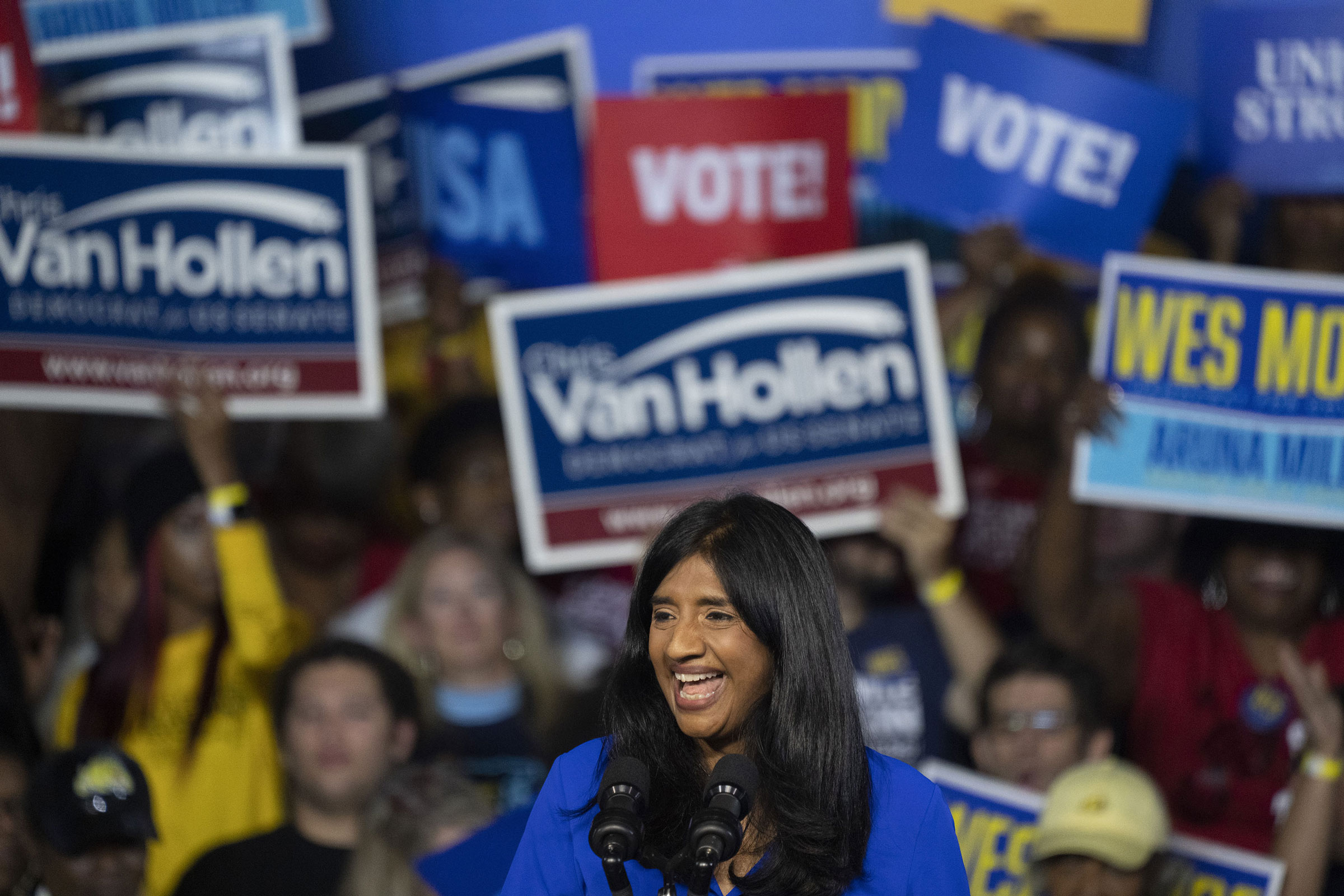As the results from the midterm elections started pouring in Tuesday night, a number of candidates made history. So far, there have been barriers broken by women including women of color, young people, and members of the LGBTQ community.
Here’s a rundown of some of the most high-profile wins. This list will continue to be updated as votes are counted and races are called.
First openly lesbian governors
Massachusetts Attorney General Maura Healey and Oregon State House Speaker Tina Kotek won their bids for governor, according to the Associated Press, making them the nation’s first openly lesbian candidates elected to the governor’s office. Healey also became the first elected female governor in Massachusetts history.
Their wins come at an important time for the LGBTQ community, as more than 300 bills have been introduced in the last year targeting access to gender-affirming care, queer identity in schools and other areas, according to the Human Rights Campaign.
“To every little girl and every little LGBTQ kid out there—I hope tonight shows that you can be whomever you want to be,” Healey said during her victory speech. Her win puts the state’s governorship firmly back in Democratic hands for the first time in eight years. Kotek told reporters after her victory speech that “it is an absolute honor” to be the first lesbian governor along with Healey. “I didn’t run for this job to be that ‘first,’ but I can tell you that being who I am is important to Oregonians across the state,” she said. “People, lots of young people, have come up to me and said thank you for running, thank you for being who you are.”
Some advocates have dubbed the midterms a “rainbow wave” as a record number of LGBTQ candidates won their races this year, according to the LGBTQ Victory Fund, a political action committee.
Healey, who was elected as the nation’s first openly gay attorney general in 2014, campaigned on a number of Democratic priorities, including expanding job training programs, making child care more affordable, and protecting access to safe and legal abortion in Massachusetts. Kotek, a progressive Democrat, served as speaker of the Oregon House of Representatives for almost a decade—the longest tenure in state history, during which she helped expand abortion access, increase the state’s minimum wage and invest in clean energy. She will succeed Democratic Governor Kate Brown, who became the nation’s first openly bisexual governor in 2015.
First Gen Z member of Congress

Generation Z got its first seat in Congress as Maxwell Frost, a 25-year-old Democrat, won his election in Florida’s 10th Congressional District, according to the Associated Press. He could be joined by Karoline Leavitt, a 25-year-old Republican running in New Hampshire.
Gen-Z, known as the post-millennial generation, refers to those born after around 1997. Candidates must be at least 25 years of age to run for a seat in the House, though it’s quite rare for candidates to win their election at such a young age. Rep. Madison Cawthorn, Republican of North Carolina, was the last 25-year-old to be elected to the House in 2020, but it hadn’t happened in more than 45 years before that.
Read More: Live Updates From the 2022 Midterm Elections
“I think the biggest generational divide I see isn’t necessarily the issues—it’s the urgency of these things,” he told TIME in October. “How quickly do they get done?”
Frost, a progressive Democrat with a background in activism, focused his campaign on gun violence, climate change, abortion rights and Medicare for all—issues that largely resonate with younger voters. He previously worked with the student-led anti-gun-violence movement March for Our Lives.
WE WON!!!! History was made tonight. We made history for Floridians, for Gen Z, and for everyone who believes we deserve a better future. I am beyond thankful for the opportunity to represent my home in the United States Congress. #FL10
— Maxwell Alejandro Frost (@MaxwellFrostFL) November 9, 2022
Frost will take over the Orlando-area seat from Democratic Rep. Val Demings, who is running for senator.
First LGBT and immigrant member of Congress
Long Beach Mayor Robert Garcia is set to become the first LGBTQ immigrant to serve in Congress, according to the AP. The 44-year-old Democrat, who immigrated to the U.S. from Lima, Peru at age 5, defeated his Republican challenger John Briscoe in the race to represent California’s 42nd Congressional district, which was previously held by Republican Ken Calvert.
This isn’t the first time Garcia has made history. He became Long Beach’s youngest mayor in 2014, as well as the first Latino, immigrant, and openly gay person to hold the office.
In a victory speech on Tuesday night, Garcia dedicated his victory to his mother, a frontline health care worker who died of COVID-19 in 2020. “That hardworking woman who worked in clinics, who cleaned houses, who was a true immigrant in every sense of the word is why I’m here today,” Garcia said.
First states led by two women
At least two states elected women to the positions of governor and lieutenant governor on Tuesday, the first states to accomplish such a landmark.
In Massachusetts, Maura Healey was elected governor and her running mate for lieutenant governor, Salem Mayor Kim Driscoll, also won, according to the Associated Press. And in Arkansas, Republican Sarah Huckabee Sanders won the gubernatorial race, according to the Associated Press, becoming the first woman to hold the seat in the state’s history. As both of the candidates for lieutenant governor in Arkansas are women, Sanders’ victory ensures Arkansas will be led by two women as well.
First South Asian woman lieutenant governor

Aruna Miller is the nation’s first South Asian woman to be elected lieutenant governor, according to the Associated Press, making history in Maryland alongside Democrat Wes Moore, who was elected as the state’s first Black governor. Miller, an Indian-American civil engineer who was raised by her grandmother in India, came to the U.S. at the age of 7, soon after the passage of the Immigration and Nationality Act of 1965, which lifted racial quotas and allowed her father to work in the country.
“I was a stranger in a strange world,” she told The Washington Post in October about her early years in the U.S.
Every day I’m inspired by the leadership of @arunamiller, who was the first Indian American woman elected to our legislature. Together, we’ll make history again by electing her the first woman of color lieutenant governor in Maryland’s history. #ItsMillerTime #WomensHistoryMonth pic.twitter.com/DMOxHV8jkv
— Gov. Wes Moore (@iamwesmoore) March 1, 2022
Read More: Two Black Women Are Making Strong Bids for Senate. Some Say the Democratic Party Has Failed Them
Miller, who also became the first immigrant to hold statewide office in Maryland, went on to serve eight years as a state delegate and has campaigned on promoting STEM education among girls and people of color, expanding public transportation in underserved communities, and mental health treatment. Her running mate, Moore, is only the third Black governor elected since Reconstruction.
First transgender man elected to a state legislature
James Roesener became the nation’s first out transgender man to win election to a state legislature, the Concord Monitor reports. Roesener won the election for New Hampshire’s 22nd state House District, Ward 8, representing part of Concord.
A 26-year-old Democrat who identifies as bisexual, Roesener joins six other openly trans men serving in elected office, and the only one serving in a state legislature, according to a tracker from the LGBTQ Victory Institute. There are currently eight openly transgender women serving as state legislators in the country, including New Hampshire State Reps. Gerri Cannon, Lisa Bunker, and Stacie Laughton. In 2017, Danica Roem became the first openly transgender person elected to a U.S. state legislature when she won a seat in Virginia’s House of Delegates.
Annise Parker, the president and CEO of the LGBTQ Victory Fund, called Roesener’s election “a resounding win for New Hampshire and for trans people across the country.”
“At a time of intensifying transphobia at all levels of government and society, he showed incredible courage throughout his historic campaign,” Parker wrote in a statement. “Trans people—and trans men in particular—remain severely underrepresented in government at every level, but we are confident his win will inspire many more trans people to run for office.”
A record number of trans candidates—more than 1,000—ran for political office in the 2022 midterms, according to the Victory Fund.
—With reporting by Jasmine Aguilera, Yasmeen Serhan, and Mini Racker
More Must-Reads from TIME
- Inside Elon Musk’s War on Washington
- Meet the 2025 Women of the Year
- The Harsh Truth About Disability Inclusion
- Why Do More Young Adults Have Cancer?
- Colman Domingo Leads With Radical Love
- How to Get Better at Doing Things Alone
- Cecily Strong on Goober the Clown
- Column: The Rise of America’s Broligarchy
Write to Nik Popli at nik.popli@time.com